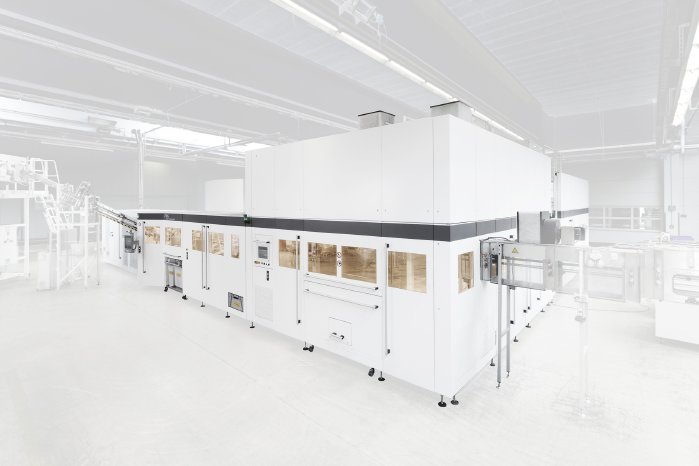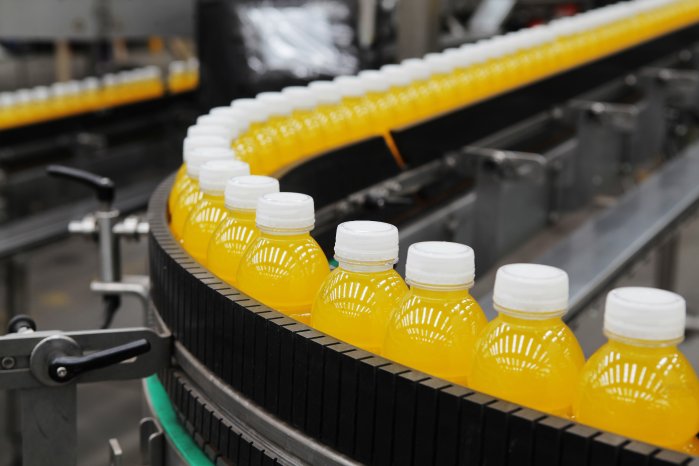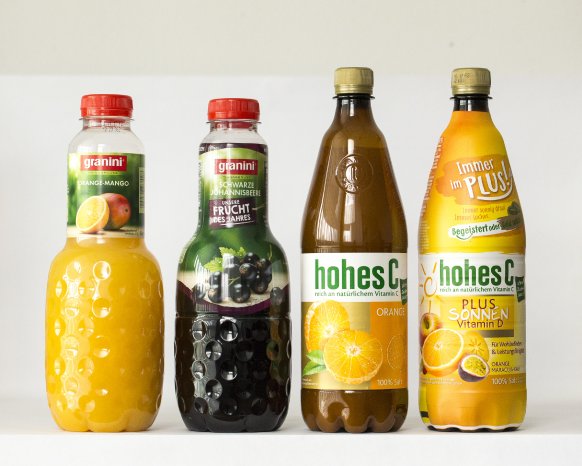When the new Packaging Law supersedes the present Packaging Ordinance at the start of next year as the legal framework for the German market, it not only defines a new target quota of 70% for returnable systems. The new regulations also prescribe increased recycling quotas for all types of packaging – also for plastics. As of January 58.5% of all plastic waste is to be recycled, i.e. the separate materials recovered and reused. From 2022 onwards this figure is to rise to 63%. At the moment the amount of plastic recycled in Germany totals around 36%.
In this context the dual waste disposal systems responsible for the collection of recyclable materials, such as non-returnable juice and nectar PET bottles, will be obliged to significantly increase their recycling quotas in the future. The new law allows them to reduce costs for easily and effectively recyclable materials and to charge more for packaging which is difficult to reuse. In the future the participation fees calculated on this basis will be determined by a number of ecological criteria. The better a type of packaging can be segregated and recycled, the lower the fees for beverage producers and retailers.
Additives in PET bottles complicate recycling
In particular, this rule has an effect on all those beverages whose packaging materials cannot be easily recycled as they contain additives. Juice and nectar producers especially, who fill their products into PET bottles, are affected in some areas. Non-returnable PET bottles are essentially fully recyclable; however, most of today’s juice and nectar bottles do not consist solely of PET. In many cases they contain multilayer, blended or scavenger materials which protect the sensitive beverages from external influences such as oxygen pickup.
The composition of these PET bottles is such that it does not allow the materials to be collected by type and recycled together with PET bottles which fall under the one-way deposit system, thus hindering the establishment of a global recycling process. “One quarter of the clear rPET flakes from yellow recycling sacks contain scavengers which impair the quality with their yellowish color, for example," states Herbert Snell, managing director of the MultiPet GmbH recycling company. “Mixing PET bottles like these with other beverage bottles made of PET makes it more much more difficult to use these rPET flakes for bottle-to-bottle recycling.”
This is why at the moment they cannot be included in the German deposit system for one-way packaging, says Snell. According to a current study by packaging market research institute GVM, about 10% of all non-returnable PET bottles do not carry a deposit, meaning that in 2017 38,000 metric tons of PET material bypassed the deposit system. At present the majority of such containers is used to bottle juices and nectars. If producers in this beverage segment fail to optimize their packaging portfolio with a view to full recyclability, they also face the threat of higher additional fees for placing classic PET bottles with additives on the market.
FreshSafe PET® juice bottles 100% recyclable
Beverage producers can find one alternative in the FreshSafe PET® technology provided by KHS. After the PET bottle has been manufactured, an ultra-thin glass coating is applied to its inside wall. These coated PET bottles are 100% recyclable as the coating is washed off during the recycling process, producing pure, fully segregated PET.
This is also confirmed by packaging expert Benedikt Kauertz, head of Environmental Assessment of Packaging at the independent Institute for Energy and Environmental Research (ifeu) in Heidelberg, Germany. “Glass-coated PET bottles allow juice and nectar bottles to be included in the pure PET cycle and their materials to be recycled together with other used PET bottles for water and carbonated beverages, for instance. To this end, however, the deposit-assisted return system must be extended to include these specially optimized bottles.”
97.9% of non-returnable deposit PET bottles are now recycled in this manner; juice bottles are not included in this figure. The first premium juice producers have realized this and are now already using the new FreshSafe PET® technology worldwide. This can reduce the circulation of non-returnable PET bottles which are hard to recycle in the medium to long term, acknowledges Mario Dechent, director of Research and Development for the Eckes-Granini Group GmbH. “We directed our attention to the full recyclability of PET juice bottles very early on. With FreshSafe PET® coating technology we’ve been using a sustainable system to fill our beverages for over ten years now, one which also permits pure-grade bottle-to-bottle recycling and thus increases the availability of useful recycling materials.”
Barrier costs also pay off thanks to lower fees
Beverage producers naturally incur additional costs when they invest in barrier technology. However, as the overall operating costs are reduced, the procurement pays off relatively quickly. With it juice and nectar producers can switch to less expensive standard PET preforms, relieving them of the obligation to source preforms from a specific manufacturer. Furthermore, compared to standard composite materials FreshSafe PET® provides a much better barrier quality and ensures much longer shelf lives. As they are fully recyclable, in the future FreshSafe PET® bottles prove more favorable when it comes to the calculation of participation fees.
KHS offers beverage producers an individual consideration of the total costs accrued when using this barrier technology. “Measured against the huge benefit of additional product protection and longer product shelf lives in particular, the costs per bottle are actually lower,” says Philipp Langhammer, product manager for barrier technology at KHS Corpoplast. “In view of the possible extra costs for the circulation of PET bottles which are tricky to recycle levied by the new Packaging Law, beverage producers should make their packaging portfolio future proof now and thus help to introduce a sustainable packaging system.”
Possible full ban on plastics which are difficult to recycle
Non-returnable PET bottles for juice and nectar which are difficult to recycle not only face the threat of higher fees due to their unfavorable properties. In the long term a complete ban on packaging such as the above could also even come into effect. The European Strategy for Plastics presented by the European Commission at the beginning of 2018 envisages all plastics having to be recycled by 2030. Various national initiatives in other countries of Europe are also promoting the reduction in plastic waste. In France, for example, the only plastics in use by 2025 at the latest should be recyclable. Moreover, in Great Britain new plastic packaging is to consist of an average of 30% recycled PET. International beverage producers have also begun to set themselves targets for a much higher recycling quota as a voluntary obligation.
“By steadily ousting PET bottles for juice and nectar which are hard to recycle the market is increasingly opening up to recyclable packaging systems,” emphasizes Langhammer. The growing demand for FreshSafe PET® also illustrates that barrier technology has already hit a nerve among beverage producers. With it KHS provides a system which can significantly raise recycling quotas for PET beverage packaging the world over. “The move away from composite materials which are difficult to recycle has already begun,” states Langhammer. “With the help of our technology the opportunities for processing pure PET are fundamentally increased.”



